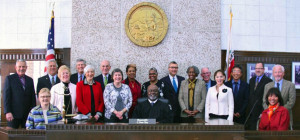Brooks Faces Censure for Building East Oakland Teen Center
Jul 19, 2013
Posted in City Auditor’s Report, Responsive Government
By Ken A. Epstein
Based on a recommendation of the Alameda County Grand Jury, the Oakland City Council is considering a motion to censure Councilmember Desley Brooks for building a teen center that serves East Oakland neighborhoods that face levels of unemployment, poverty and violence that are among the worst in the country.
Council President Pat Kernighan placed the motion, which amounts to a formal reprimand, on the City Council’s agenda after the Grand Jury recently issued its Final Report for 2012-2013, finding that Brooks “inappropriately made administrative decisions throughout the process” of building the teen center between 2007 and 2011.
Putting pressure on council members, the Grand Jury also cited the council’s “inability to self-police,” calling on the council to censure Councilmember Brooks.
Before looking at the Grand Jury’s findings, it is important to recognize what a grand jury report is and is not.
The civil grand jury is a “watch-dog” panel that once a year issues a final report, which details its investigations and makes “recommendations to local and county government agencies.”
The jury does not make criminal findings and does not bring charges. What it does is make recommendations.

Further, the report does not allege that Brooks gained personally in any way in the building of the teen center. She did not enrich herself or her friends, she did not hire friends or relatives. And she did not make sweetheart deals with contractors.
What the report says is that she “circumvented” city contracting, purchasing and hiring rule to ensure that the project was completed.
Brooks was able to have the teen center built at the corner of 58th Avenue and International Boulevard at a time when “other parks and recreation programs were being cut and projects with higher priorities went unfunded,” the grand jury said in its report entitled “Misgoverning the City of Oakland.”
In other words, it could be said that the Grand Jury is blaming her for successfully representing her constituents to build a teen center when other councilmembers failed or had no interest in doing so.
In fact, the city had allocated $500,000 to each councilmember to build a teen center in their district, except councilmember Reid, who was having a different project built
But none of the councilmembers except Brooks built and opened a teen center. While Councilmember Nancy Nadel built one in West Oakland, it sat empty for years due to lack of
funding. Recently Councilmember Lynette McElhaney has secured new funding to open the West Oakland center in the coming year.
How was Brooks able to accomplish such a feat? She is after all only one of eight members of the council and has no direct authority or hire or write checks on the city’s account.
She built the center, the Grand Jury report said, “often with full knowledge and complicity of city staff.” Brooks said that she completed the project working with three successive City Administrators.

Though the report almost exclusively focuses on Brooks, does it allege she was the only member who worked to “influence administrative decisions?” Not at all.
“The Grand Jury learned that some council members would often put pressure on city staff to get their own issues prioritized above other city matters.”
The report even partially acknowledged the reality of the City of Oakland, where city staff has regularly been accused by community members of mismanaging funds and ignoring and thwarting the decisions of the City Council.
There has existed a “culture of interference” in Oakland government, the report said, in part due to “the fact that large government bureaucracies operate using polices and procedures that can cause change or improvements to occur slowly.”
While citing interference by former Ignacio de la Fuente in the building of the Fruitvale Transit Village, it says the conduct “may appear to be insignificant and even well-meaning in many circumstances.”
“The Grand Jury heard testimony that the Fruitvale Transit Village (near Fruitvale BART)… may never have been completed without the pressure exerted by a former member of the City Council
“The interference included causing a public library to be uprooted from its established neighborhood location, and relocated to a second floor space to serve as an anchor tenant and revenue stream for the project.”
What the Grand Jury report and certain councilmembers are calling interference is common practice on the council and what members must do if they wish to represent the residents of Oakland, according to de la Fuente in an interview with the Post.
“All of us have done something when it comes to pushing to solve our constituents needs,” he said.“All councilmembers get calls from their constituents demanding actions on their needs and problems and concerns.”